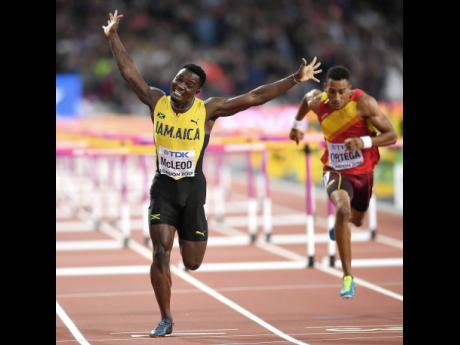Dalton Myers | Growing the local sport industry
On Friday, April 12, the University of Technology Jamaica (UTech, Ja) hosted its 9th Annual Conference on Science and Sport under the theme, ‘Sports: Golden Opportunities for Development and Wealth Creation’ at its Papine campus. It provided an opportunity for students and sports personnel to get a better understanding of the business side of sport.
This Faculty of Science and Sport’s (FOSS) initiative comes at a time when we have a heightened discussion about building our sporting industry, and it forces us to reflect on the many opportunities in Jamaica and the region on which we can capitalise. In fact, I thought the focus was timely as we engage athletes and support personnel on topics like equity and investments opportunities.
The conference featured dynamic speakers discussing varying aspects of the commodification of sport, including but not limited to:
- Creating economic opportunities through sports.
- Projecting for greatness and managing the athlete’s personal brand.
- Rugby in Jamaica and its impact on Rugby League World Cup.
- Planning for retirement from sports and what athletes should do now.
- The issues surrounding wearing braces.
- Developing a sport business model.
I was fortunate to be a presenter at the conference. I thought the discussions were very important, with practical solutions being given.
My Main Takeaways
Sport is a big business, cliché but true. Jamaica can capitalise on opportunities and earn more from the sporting industry, but this will take involvement from the various stakeholders. One of the frustrating aspects is the lack of continuity in programmes as governments do not always build on the work of previous administrations. As guest speaker Chris Dehring noted, the non-existence of ‘Jamaica Sport’ – a body that was tasked with helping to drive sports investments – is one such case. Dehring’s presentation on his involvement with the 2007 ICC Cricket World Cup was important because it gave us an idea of the marketing and broadcast right challenges when hosting mega events.
Second, the sessions sought to give practical solutions to developing sports in the country. Generating income from sport depends heavily on the entertainment value of the sport, the extent of national and international participation, the cultural status attached to the sport, and the prominence of the sport in the school sports system or sporting academy worldwide. These areas are important in generating income from teams, individuals or events we host annually.
Additionally, we must recognise that each team, athlete and sport association is a brand. The value of this brand also depends on the performance of these key players. The sport product is dependent on athlete performance on and off the field of play. Importantly though, there must be key pointers for athletes about managing the various forms of media that are out there and not see social media as a private space, but a public domain. Therefore, each actor in the sports product has an impact on whether the value of the product remains high.
Fourth and most important, we must now encourage more student athletes and professional athletes to start investing early. We need to look at various opportunities that might be available for developing unique goods and services that can be monetised. Increasingly, there is a push for more young people to go into entrepreneurship and this should be encouraged. Sports can provide that platform. In Jamaica, we see more people getting involved as entrepreneurs in areas such as sport law, physiotherapy, agents and managers, as well as our coaches and administrators for track clubs that now have a business model. There are several other areas that can be explored by people who want to help build our sporting industry, and we haven’t even started discussing sport tourism.
We need more engagement platforms that can provide a medium through which administrators in national associations, students and other sport-related personnel can learn from the speakers, as well as find more ways to develop various brands. Similar to the UTech, Ja Conference, these discussions need to be practical. My hope now is that the educators in FOSS will continue engaging in more research, find the gaps and offer practical solutions through data analysis. Tertiary institutions must be the leaders in developing a sustainable sporting industry that encourages business and investment.
Dalton Myers is a sports consultant and administrator. Email feedback to daltonsmyers@gmail.com or tweet @daltonsmyers


